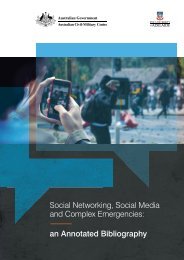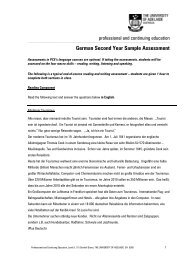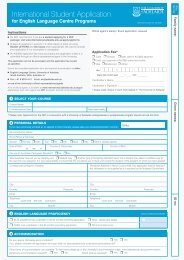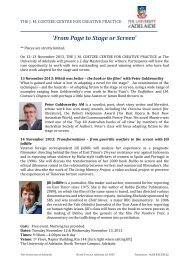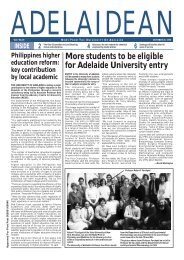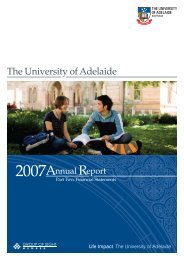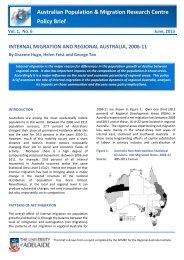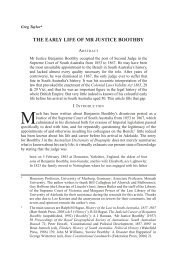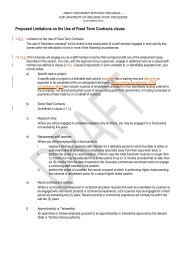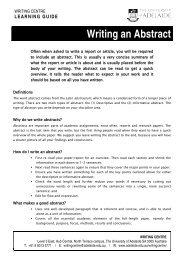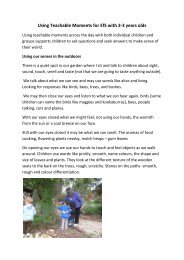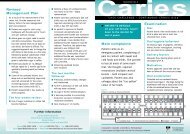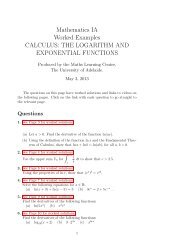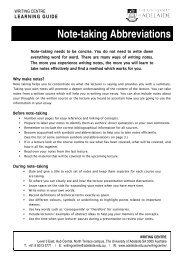Unbridling the Tongues of Women - The University of Adelaide
Unbridling the Tongues of Women - The University of Adelaide
Unbridling the Tongues of Women - The University of Adelaide
You also want an ePaper? Increase the reach of your titles
YUMPU automatically turns print PDFs into web optimized ePapers that Google loves.
<strong>Unbridling</strong> <strong>the</strong> tongues <strong>of</strong> women<br />
Her appointment to <strong>the</strong> paper invited her to contribute not only literary but also<br />
‘social’ articles. ‘Leading articles’, she remembered, ‘were to be written at my own<br />
risk. If <strong>the</strong>y suited <strong>the</strong> policy <strong>of</strong> <strong>the</strong> paper <strong>the</strong>y would be accepted, o<strong>the</strong>rwise not’. 18<br />
Spence ‘felt as if <strong>the</strong> round woman had got at last into <strong>the</strong> round hole which<br />
fitted her’. 19 She was employed in <strong>the</strong> public sphere, in a world occupied exclusively<br />
by men. She was at last earning her own living. Her articles for <strong>the</strong> Register were not<br />
<strong>the</strong> first to bring her payment – she had earned £12 from <strong>the</strong> Cornhill Magazine,<br />
£10 from Wilson, and £8.15s. from Fraser’s Magazine – but now, for <strong>the</strong> first time<br />
in her life, she was her own independent breadwinner. By <strong>the</strong> 1880s she considered<br />
that she was bringing in ‘a very decent income’ with her pen. ‘I don’t think <strong>the</strong> said<br />
income was ever more than £300 a year’, observed Lucy Morice, ‘and generally less’.<br />
But it meant independence. And she had access to an established public forum –<br />
<strong>the</strong> colony’s oldest newspaper. She rejoiced in ‘<strong>the</strong> breadth <strong>of</strong> <strong>the</strong> canvas’ on which<br />
she could draw her ‘sketches <strong>of</strong> books and life’. 20 She had had to wait a long time<br />
for such a break in <strong>the</strong> solidity <strong>of</strong> <strong>the</strong> patriarchal order <strong>of</strong> her society; she was in<br />
her 53rd year. It was possible, undoubtedly, only because her appointment did not<br />
require her presence among <strong>the</strong> men in <strong>the</strong> <strong>of</strong>fices and around <strong>the</strong> press in Grenfell<br />
Street. Spence’s appointment was as a regular ‘outside’ contributor. That meant that<br />
she worked at home, but it meant, as well, that while she was working in her ‘little<br />
study’ with her books, pigeon holes, and her mo<strong>the</strong>r knitting in <strong>the</strong> rocking chair<br />
by <strong>the</strong> low window, she was reaching out into <strong>the</strong> world beyond <strong>the</strong> domestic sphere<br />
that she inhabited. 21 She had made a real breach in <strong>the</strong> barrier dividing <strong>the</strong> domestic<br />
and public spheres.<br />
Spence did more, too with her journalism. Her articles<br />
ranged widely, treating matters such as land legislation,<br />
wages, agricultural machinery, quite as much as<br />
questions about marriage, domestic labour and forms <strong>of</strong><br />
hospitality. Simply by writing about <strong>the</strong>m, she was asserting<br />
women’s right to hold views about <strong>the</strong> concerns <strong>of</strong> <strong>the</strong><br />
public sphere, and to have those views heard. Likewise,<br />
she was claiming, in <strong>the</strong> public sphere, <strong>the</strong> propriety <strong>of</strong><br />
attention to <strong>the</strong> concerns <strong>of</strong> <strong>the</strong> domestic. Just as her decision<br />
not to marry evinces a resolution to encounter <strong>the</strong><br />
whole world directly, not only part <strong>of</strong> it, so her journalism<br />
shows her regarding <strong>the</strong> whole world with two eyes, not<br />
110<br />
Bay window in <strong>the</strong> house in<br />
Trinity Street, College Park,<br />
where Ca<strong>the</strong>rine Helen Spence<br />
lived and wrote.<br />
Photograph by Susan Magarey.



